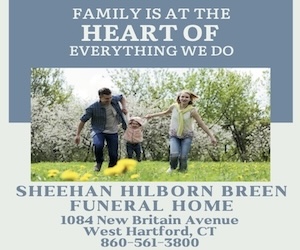
By Cindy Mindell
As a kid growing up in Fairfield, Bill Glucroft spent the High Holidays at Congregation Beth El, where he and his family were members and where his parents still belong.
This year, Glucroft is davening in Berlin, Germany, his city of residence since 2009. The 30-year-old is also playing an active role in Berlin’s unexpected Jewish revival.
Glucroft came to Berlin by way of Israel. After earning a BS in Digital Journalism at Emerson College in 2007, he received a scholarship from the American Zionist Movement to spend a semester in the University of Haifa Peace and Conflict Management Studies program. While interning at an Israeli-Arab civil rights organization, he met a woman from Berlin and eventually followed her there in September 2009. He then earned a Certificate in Teaching English to Speakers of Other Languages (CELTA) from the Berlin School of English.
As a self-employed content producer, Glucroft is currently a video editor for the American Academy in Berlin, a translator for Jewish Museum Berlin, and a voice-over artist for ads and video games.
He is also a co-founder of the eight-month-old Friends of Fraenkelufer (Freunde der Fraenkelufers in German, or FdF), a registered non-profit that supports the Fraenkelufer Synagogue in the Kreuzberg district of Berlin.
Founded by an Orthodox congregation in 1912, the synagogue cum community center complex was designed by Alexander Beer, who served as chief architect of the 90,000-strong Berlin Jewish community, and who oversaw the building’s construction between 1913 and 1916. In addition to the 2,000-seat main sanctuary, the structure also housed a religious school and kindergarten, social service facilities, several residential apartments, and two smaller sanctuaries for weekday services and youth services.
Most of the building was destroyed during Kristallnacht in 1938. The youth sanctuary, which survived the attack, comprises today’s Fraenkelufer Synagogue, rededicated as a Conservative congregation on Erev Pesach 1959. The synagogue was originally named for the street it was built on, Kottbusser Ufer, which was rededicated in 1947 as Fraenkelufer Street, in tribute to Albert Fraenkel (1864-1938), a German-Jewish physician who helped establish Streptococcus pneumoniae as a cause of bacterial pneumonia.
The Kreuzberg area has become popular with young people and immigrants, Jews and Israelis among them.
“So it was a shame that the synagogue, like many around the world, was dying out,” says Glucroft, who helped bring new life to the Fraenkelufer in 2012.
“A group of us in the ‘new guard,’ with the blessing of several in the ‘old guard,’ started very small, after a Rosh HaShanah kiddush I sponsored in memory of my grandfather, while my parents were visiting, attracted a huge crowd,” he recalls. “We realized that there is an interest among young people and families to be part of an active community, if only they had a reason to come.”
In January of this year, Glucroft and several fellow active members met to vote on forming a non-profit. He now serves on the FdF board as treasurer and, as the native English speaker and communications professional, he is also in charge of international outreach. He credits the other three board members with the “heavy lifting – easily a fulltime job on top of what actually pays our rents,” he says. Another small group helps with planning, raising awareness, and implementing FdF’s events. Nearly 700 people are part of the organization’s Facebook group, with another 350 following its public profile, and FdF enjoys strong relationships with various Berlin and German media outlets.
In recent years, Berlin’s Jewish population has been growing, with the arrival of Israelis and Jews from other countries. Glucroft sees the phenomenon as part of a larger migration of young people attracted by the city’s comparatively low rents, strong economy, and a unique sense of freedom.
“I wouldn’t say the influx is as massive as we in the Jewish bubble perceive it as; the average non-Jew living here probably doesn’t notice it,” he says. “However, for Jews, this is an historic and positive shift that proves we can build something new and good out of the shadows of the past. I think it says something less positive about Israel, given how many especially young and progressive people are leaving.”
FdF is right in the middle of Berlin’s growing Jewish community. The shul’s monthly Shabbat kiddush regularly attracts more than 60 people – significant, Glucroft says, because it is sometimes difficult to get a minyan.
“The crowd is a wonderful mix ranging from secular to observant, students and families, locals and immigrants, and non-Jews interested in learning more,” he says. “And because our meals are almost always potluck, because we don’t have money for catering, it means everyone has to chip in and participate.”
“We work hard to give people a reason to come to the shul,” he adds, “whether it’s religious, cultural, family-oriented, or just a nice meal together – something beyond just Friday night, Saturday morning, and holiday services; more like the original Greek meaning of ‘synagogue:’ a place of coming together.”
FdF also partners with other religious, cultural, and civil organizations around the city. “We have a very good and growing relationship with the head of the Berlin state parliament, Raed Saleh,” Glucroft says. “Our neighborhood is a wonderfully diverse mix of young and old, and many of our neighbors are of Arab and Turkish origin, making it the ideal environment for building relationships across cultures and backgrounds. We want to live in an urban society that is open, welcoming and democratic, where people see each other first and foremost as neighbors and residents of the same city, regardless of what may be happening elsewhere in the world. That goes for the kind of Jewish community we strive to help build, as well.”
This summer, for the first time, the synagogue participated in Berlin’s annual Long Night of Religions, a city-wide event with more than 90 venues. The Fraenkelufer attracted nearly 200 visitors, who enjoyed a performance by the grassroots Hebrew Choir Berlin, which Glucroft is a member of.
Now, the shul is in the midst of holiday celebrations. Erev Rosh Hashanah features a potluck kiddush and services. Yom Kippur ends with a communal break-fast – “which, thanks to our Eastern European and Russian congregants, always has a way of starting with vodka,” he says. There will be a meal in the sukkah for Sukkot, followed by one of Glucroft’s favorite times at the synagogue – Simchat Torah — when candy pelts down from the upstairs gallery.
New this fall holiday season is a drive to collect clothing, toys, and other items for the many refugees seeking haven in Berlin, an issue that FdF will be involved in long-term, beginning with the international “Mitzvah Day 365” in November.
Glucroft sees the renewed Jewish presence in his adopted city as a part of a historic relationship that was only interrupted by the Holocaust, but not terminated forever.
“Berlin, and Germany in general, have a massive presence in Jewish identity today,” he says. “Long before expulsion and extermination, Jewish thought and thinkers developed here, which then got exported to the U.S., formed much of the basis for the development of Israel, and has since greatly influenced how we’ve come to define modern Judaism – at least, Ashkenazic. So, it is vital that this relationship continue – for Germany and for the Jews.”
As for his personal experience as a Jew in Berlin, Glucroft says that he feels very lucky to be there.
“By sheer cosmic fortune, I was born into this era and not a previous one, which affords me a level of freedom and opportunity never before thought possible for most people, and especially for Jews,” he says. “That freedom is a wonderful feeling, but also a great responsibility. We owe it to both past and future generations to do something good with our fortune and privilege, and build a community based on openness and diversity.”
FdF is gearing up for the synagogue’s centennial in 2016. Glucroft welcomes visitors from around the world to the Fraenkelufer.
For more information email william@fraenkelufer.de or visit fraenkelufer.wordpress.com.
To view a short film about the Fraenkelufer: https://vimeo.com/111580495.
CAP: The Fraenkelufer Synagogue in Berlin, Germany.








 Southern New England Jewish Ledger
Southern New England Jewish Ledger










